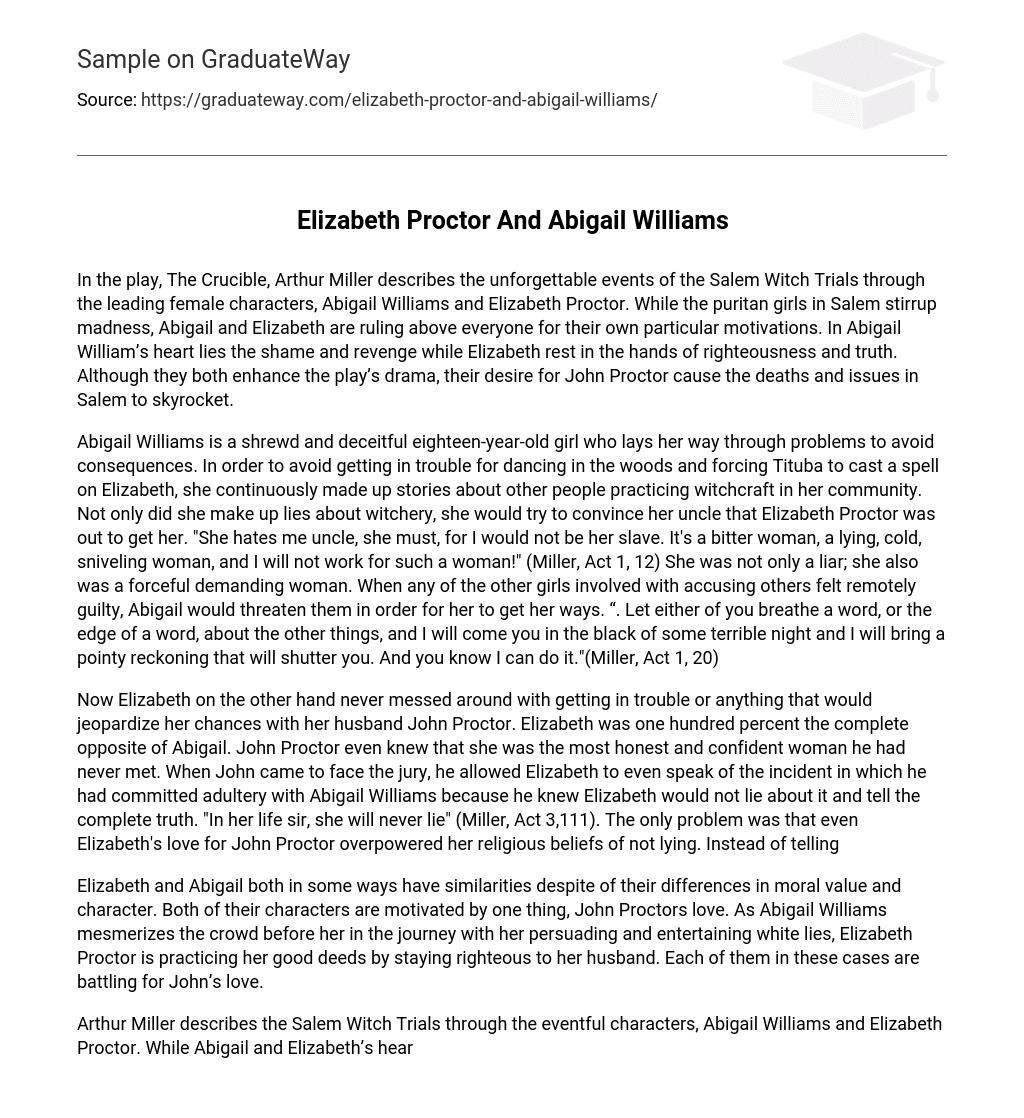In Arthur Miller’s play The Crucible, the unforgettable events of the Salem Witch Trials are depicted through the leading female characters, namely Abigail Williams and Elizabeth Proctor. While the puritan girls in Salem incite madness, Abigail and Elizabeth each hold their own motivations and exert power over others. Within Abigail William’s heart lies shame and a desire for revenge, while Elizabeth is driven by righteousness and truth. Although both women contribute to the dramatic tension in the play, their competing desires for John Proctor ultimately lead to an escalation of deaths and troubles in Salem.
Abigail Williams, an eighteen-year-old girl, is both cunning and deceitful. She manipulates situations to avoid facing consequences, such as when she danced in the woods and coerced Tituba into casting a spell on Elizabeth. To divert trouble away from herself, Abigail fabricates stories about others engaging in witchcraft within her community. Furthermore, she cunningly tries to convince her uncle that Elizabeth Proctor harbors animosity towards her. Abigail states, “She hates me uncle, she must, for I would not be her slave. It’s a bitter woman, a lying, cold, sniveling woman, and I will not work for such a woman!” (Miller, Act 1, 12). Her deceitfulness is coupled with a forceful demeanor. Whenever any of the other girls who participated in the accusations begin to feel guilty, Abigail resorts to threatening them to ensure her own control. She warns them, “Let either of you breathe a word, or the edge of a word, about the other things, and I will come to you in the black of some terrible night and I will bring a pointy reckoning that will shatter you. And you know I can do it.” (Miller, Act 1, 20)
Now Elizabeth, in contrast, always conducted herself responsibly and avoided any behavior that could put her relationship with her husband John Proctor at risk. Elizabeth was completely different from Abigail in every way. John Proctor himself recognized her as the most trustworthy and self-assured woman he had ever encountered. When John had to face the jury, he even allowed Elizabeth to openly discuss the incident where he had committed adultery with Abigail Williams because he knew Elizabeth would never deceive and would tell the whole truth. “In her life sir, she will never lie” (Miller, Act 3,111). However, the only issue was that Elizabeth’s love for John Proctor outweighed her religious principles against lying. Instead of telling
Despite their differences in moral value and character, Elizabeth and Abigail share some similarities. Both of their actions are driven by their love for John Proctor. While Abigail manipulates and entertains the crowd with her persuasive lies, Elizabeth remains faithful to her husband and performs good deeds. In each case, they are vying for John’s affection.
According to Arthur Miller, the Salem Witch Trials were depicted through two significant characters – Abigail Williams and Elizabeth Proctor. Although both Abigail and Elizabeth were involved with John Proctor, their contrasting personalities led to a love story tainted by jealousy, ultimately leading to widespread panic in Salem. It can be argued that without the actions of Abigail Williams and Elizabeth Proctor, none of the resulting chaos would have taken place.
Works Cited
- Miller, Arthur. The Crucible. N.p.: n.p., 1953. Print.





